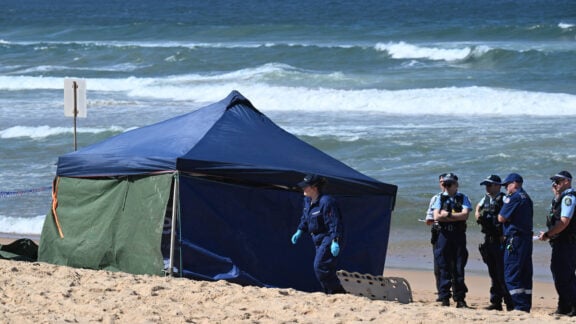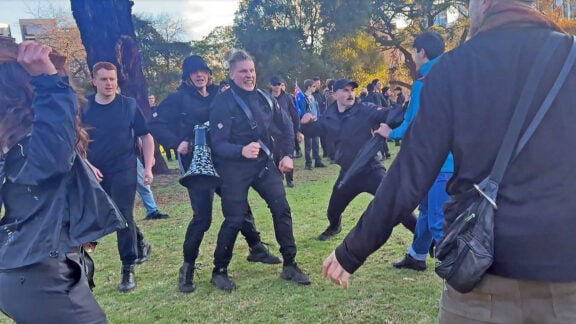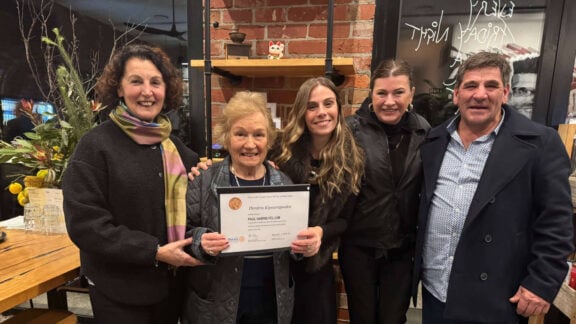Even before I reach Odisho’s front door, my ears are assailed by the sound of Giorgos Dalaras’ voice emanating from beyond threshold: «Μες το μαχαλά, πέφτει κουμπουριά…»
Then, the sound of shuffling and a heavy voice struggles to be heard over the music: «Εντάξει, περίμενε ρε φίλε, σού ανοίγω τώρα,» aspirating the s.
As the door opens, Odisho’s broad white grin is blinding. He bears in his hand a bottle of ouzo. «Χρόνια πολλά βρε φίλε! Έλα να πιεις ούζο.» Being led down the hallway and into the dining room, I note the conspicuously mounted Greek souvenir plates, the statues of the Greek gods on the buffet and a bouzouki hanging nonchalantly next to an unremarkable print of a non-descript blue and white church on some non-descript Greek island, all of which populates many a Greek home in Melbourne and which should not cause the eyebrow to be raised here, save that Odisho is manifestly not Greek, but Assyrian.
Every year, close to Christmas, Odisho and his nostalgic Assyrian friends, who lived in Greece in the late seventies and early eighties, prior to their emigration to Australia, get together to have a pre-Christmas dinner. The sole purpose of that dinner is to reminisce about a Greece that is inextricably linked to their lost youth. They mouth Greek phrases and speak to each other in nineteen eighties Greek, all the while drinking ouzo and playing the music that was popular in Greece during the time of their sojourn there, in order to evoke that era. My sporadic presence at these Poseidonian rituals, in some bizarre way, legitimizes them, for as a speaker of broken Assyrian, and as a Greek-Australian who did not experience Greece in the period in which my convivial diners were there present, I lend the solemn proceedings, a modicum of ersatz authenticity.
Tonight is different from other nights, however, because as Yiannis Parios’ «Να μ’ αγαπάς τώρα,» is allowed to play out its final grace notes, Odisho finally reveals to us how he got to Greece in the first place, in time to celebrate his first Christmas there:
“It was 1976. I wanted to leave Iraq to go to Greece, and I was a student. I went to the passport office and in those days, the forms were so complicated, that there were professional scribes with typewriters set up outside the office to assist people with their applications. I approached one and he asked me:
“What do you do?”
“I’m a student,” I responded.
“That’s not good. They will never let you out if you are a student,” he shook his head knowledgeably. “Do you do anything else? What else can I write?”
“I don’t know, you are the professional. You write whatever you think is necessary,” I replied, in turn.
He wrote something on the form and told me to take it in to the passport office, where I would be interviewed. For some time I waited in the office, until an army colonel marched up to me briskly.
“Follow me, young man,” he ordered.
I stood to attention and saluted him, as was the custom and gave him my papers. He pored over them diligently, his brow growing increasingly furrowed as he scanned down the page. Suddenly, he stopped.
“What is this? You are unemployed?” he asked.
“No, sir, I am a student,” I responded, still standing to attention.
“A student, do you say? Then why have you written that you are unemployed?”
“I…..”
“Go and tell the idiot who helped you fill out this form to change this to ‘worker’ and come back here at once,” he barked.
I did as I was told and returned a half an hour later, submitting the amended documents to the colonel.
“Ah, see that’s better,” the colonel beamed. “Now when you go abroad, the foreigners will have respect for you and for Iraq. Who would respect a country full of the unemployed? Bon Voyage.”
As it turns out, I did not make it to Greece at that time. In those days, visas were issued on the day of travel by the Greek embassy and a series of mishaps intervened that resulted in me missing my flight. At the commencement of the Iran-Iraq War, travel restrictions were instituted and I could not get out. As things worsened in the country, I left Iraq illegally through Turkey and stayed in Istanbul. From there I tried on seven separate occasions to cross into Greece over the Thracian border, but each time, we would be caught either by Greek or Turkish border guards. However, you will find my last attempt interesting.
It was Christmas Eve. We three, [he points to another two of our fellow diners] had just crossed the border just after midnight and as the people smugglers had taught us, we were inflating a rubber dinghy which we were going to us to cross a river. We managed to get all of our party across safely when the guards found us. They took us to an outpost. On the way, they questioned us about our nationality and our religious affiliations. I pulled out my cross and showed it to them. “Jesus, Christmas,” I told him.
Taking me aside, one the guards whispered: “Look, I recognize you. You’ve tried to come this way before. I’m sorry but I have to take you to my commanding officer. Just be wary of one thing. If he asks you where you came from, do NOT, under any circumstances say Istanbul. You say Κωνσταντινούπολη. Can you say it? Say it with me slowly. Make sure you don’t forget. It’s important.”
When we arrived at the outpost, there was no one on duty. Instead, we could hear the radio blaring and a lot of voices singing. The guards were having a Christmas party and were blind drunk. We were taken before the commanding officer, a squat, bald man with a thin moustache. Teary eyed, cheeks flushed crimson with alcohol, he shouted:
“What animals are these?”
He staggered off his chair, and poked his swollen face into mine. Reeling even closer towards me, he coughed:
“Where did you come from?”
“I…iii”
“Λέγε. Where did you come from?”
“Ist….”
I had a mental blank. I could not remember how to pronounce the word the guard had told me and was terrified we would be beaten and sent back.
“Tell me now you animal,” the commanding officer screamed.
” K,,, Kostadinopoli,” I stammered, finally.
“Of course you did palikari,” he crowed triumphantly. “You came from our city but those filthy Turks have taken it from us. But the time will come when the city will be ours and the Turks will be sent back to the Red Apple Tree….” He walked away, only to turn back and command indifferently: “Let them go. It’s Christmas. Χρόνια πολλά. Ο Θεός μαζί σας.” That was the first time in my life that I could celebrate Christmas openly. I was alone, but ecstatic.
I celebrated six wonderful Christmases in Aegaleo, and was the last of my friends to leave Greece. When I arrived at Melbourne Airport, just before Christmas, they all came to greet me, all of these guys sitting around the table here today. But what type of welcome do you think I received? As soon as I walked through the doors, they started yelling at me: “What are you doing? Are you crazy? Go back! Greece is far better.” And it is true. There is no place like Greece. The years we spent there are golden.”
We listen to some of Mitropanos’ early songs and they ask me whether I am familiar with the type of music a certain group of Greek musicians used to play at the Retreat Hotel. I gasp. “You mean Apodimi Compania? How do you know them?” Odisho and his band of Greek nostalgics then reflect upon how important the rebetiko outfit “Apodimi Compania” was in making them feel at home and adjust to their new life in Melbourne. Week after week, they would visit the Retreat Hotel, listen to Apodimi play and contextualise their own experience of double ξενιτιά. I extract an early Apodimi Compania CD from my car and begin to play it. I am unsurprised to note that they know all the words by heart. For this is Apodimi’s greatest achievement: to manage to touch the hearts of all who heard them, regardless of ethnicity and to help them find, in their interpretation of rebetika, a common human denominator.
As his friends attempt to execute a rather wobbly zeimbekiko to the strains of a karsilama, I help Odisho to wash the dishes. One slips out of his hands and smashes on the tiles below. Immediately, the dancers whoop: «Σπάσ’τα! Σπάσ’τα!» One of the revelers, looking distracted for a moment as if he had lost his car keys, tentatively offered: «Γούρι;» When I nodded, he beamed at the affirmation.
It was only when Thanos Petrelis’ «Θυμίζεις κάτι από Ελλάδα,» made itself manifest upon Odisho’s playlist that I determined it was an opportune time to leave. I farewelled the party in Assyrian, and they responded to me in Greek. «Αχ βρε φίλε,» Odisho sighed. «Η Ελλάδα είναι μόνο μία. Καλά Χριστόυγεννα. Και του χρόνου στην Ελλάδα» And we both turned away, so that his tears could not be seen.






